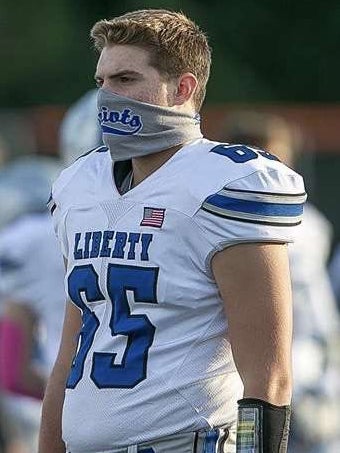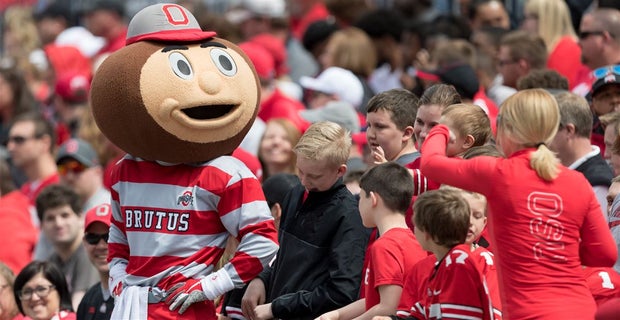MotS&G Marvin Harrison Jr., TreVeyon Henderson, stars in the making
- News
- 0 Replies
Marvin Harrison Jr., TreVeyon Henderson, stars in the making
Mike via our good friends at Men of the Scarlet and Gray
Visit their fantastic blog and read the full article (and so much more) here
Coming to a program like Ohio State as a highly ranked recruit is enough pressure for young collegiate athletes, but living up to the hype and making a name for yourself early on is another thing.
Former 4-star WR Marvin Harrison from St. Joseph’s Prep High School and 5-star RB TreVeyon Henderson from Hopewell High School are doing just that — living up to expectations.
Marvin Harrison Jr.
From the minute Harrison Jr. stepped onto campus Ryan Day was impressed with his ‘more’ defined physique, and he didn’t disappoint on the field either. — Harrison Jr, the son of NFL Hall of Famer Marvin Harrison, was the first freshman from the offensive side of the ball to lose his black stripe. You saw why from the Ohio State Football media team post ”Throw it up. Marv will catch it” (@OhioStateFB) as Harrison Jr. caught three INCREDIBLE passes, one being a tough catch in the back of the endzone for a touchdown thrown by quarterback C.J. Stroud.
Coach day had high praise for the freshman WR:
“Excellent attention to detail with his routes,” said Day. “Somebody who cares a lot. He’s in here after hours. He’s here early in the morning. He takes a lot of pride in his work, and he’s making plays.”
Reports say Harrison Jr. lined up with the second-string offense, along with junior Jameson Williams and fellow freshman Emeka Egbuka.
TreVeyon Henderson
Being ranked the #22 player in the country, and #1 ranked running back — you’re going to have a lot of eyes on you, and Henderson didn’t disappoint anyone with his performance in camp thus far.
Henderson did not get to play his senior year of high school football at Hopewell due to the COVID-19 pandemic but seems to have left off right where he started — Henderson rushed for 2,424 yards and 45 touchdowns his junior season.
Henderson is the first freshman running back to lose his black stripe in spring practice since Urban Meyer introduced the routine in 2012. (He was the third player to lose it this spring — (Sawyer, Harrison Jr)
Coach Day met with the media this past week and stated that Henderson is doing all the right things early:
“He’s had a good attitude. He’s got a good work ethic. He’s done everything right so far,” Day said. “Now he’s still gotta play more and learn every day. He needs a million reps. But the talent is there. The work ethic is there. I think he’s going to have a really bright future here. He’s done everything we’ve asked him to do so far.”
Day went on saying: “He’s flashed at times already,” Day said. “So excited to see what that looks like during the spring game.”
It’s too early to say Harrison Jr and Henderson are going to be immediate factors for the Buckeyes offense this season, as they have a LOADED WR and RB room, but there’s no denying the future for these two freshmen are BRIGHT, and they will see the field sooner rather than later.




Continue reading...
Mike via our good friends at Men of the Scarlet and Gray
Visit their fantastic blog and read the full article (and so much more) here
Coming to a program like Ohio State as a highly ranked recruit is enough pressure for young collegiate athletes, but living up to the hype and making a name for yourself early on is another thing.
Former 4-star WR Marvin Harrison from St. Joseph’s Prep High School and 5-star RB TreVeyon Henderson from Hopewell High School are doing just that — living up to expectations.
Marvin Harrison Jr.
From the minute Harrison Jr. stepped onto campus Ryan Day was impressed with his ‘more’ defined physique, and he didn’t disappoint on the field either. — Harrison Jr, the son of NFL Hall of Famer Marvin Harrison, was the first freshman from the offensive side of the ball to lose his black stripe. You saw why from the Ohio State Football media team post ”Throw it up. Marv will catch it” (@OhioStateFB) as Harrison Jr. caught three INCREDIBLE passes, one being a tough catch in the back of the endzone for a touchdown thrown by quarterback C.J. Stroud.
Coach day had high praise for the freshman WR:
“Excellent attention to detail with his routes,” said Day. “Somebody who cares a lot. He’s in here after hours. He’s here early in the morning. He takes a lot of pride in his work, and he’s making plays.”
Reports say Harrison Jr. lined up with the second-string offense, along with junior Jameson Williams and fellow freshman Emeka Egbuka.
TreVeyon Henderson
Being ranked the #22 player in the country, and #1 ranked running back — you’re going to have a lot of eyes on you, and Henderson didn’t disappoint anyone with his performance in camp thus far.
Henderson did not get to play his senior year of high school football at Hopewell due to the COVID-19 pandemic but seems to have left off right where he started — Henderson rushed for 2,424 yards and 45 touchdowns his junior season.
Henderson is the first freshman running back to lose his black stripe in spring practice since Urban Meyer introduced the routine in 2012. (He was the third player to lose it this spring — (Sawyer, Harrison Jr)
Coach Day met with the media this past week and stated that Henderson is doing all the right things early:
“He’s had a good attitude. He’s got a good work ethic. He’s done everything right so far,” Day said. “Now he’s still gotta play more and learn every day. He needs a million reps. But the talent is there. The work ethic is there. I think he’s going to have a really bright future here. He’s done everything we’ve asked him to do so far.”
Day went on saying: “He’s flashed at times already,” Day said. “So excited to see what that looks like during the spring game.”
It’s too early to say Harrison Jr and Henderson are going to be immediate factors for the Buckeyes offense this season, as they have a LOADED WR and RB room, but there’s no denying the future for these two freshmen are BRIGHT, and they will see the field sooner rather than later.
Continue reading...








/cdn.vox-cdn.com/uploads/chorus_asset/file/22803569/usa_today_15439763.jpg)
/cdn.vox-cdn.com/uploads/chorus_asset/file/22803570/usa_today_15427167.jpg)
/cdn.vox-cdn.com/uploads/chorus_asset/file/22803579/1196616863.jpg)
/cdn.vox-cdn.com/uploads/chorus_asset/file/22803611/usa_today_13743107.jpg)
/cdn.vox-cdn.com/uploads/chorus_asset/file/22803615/usa_today_15386869.jpg)

